中考英语语法主题课件—代词
图片预览

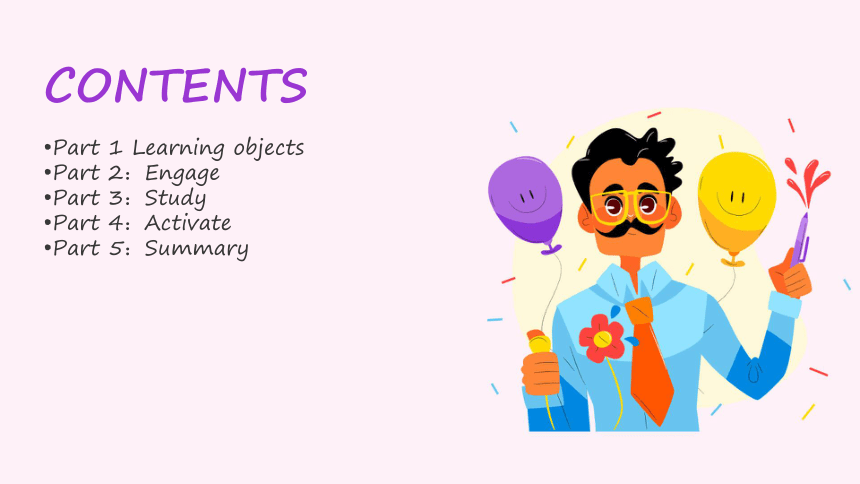
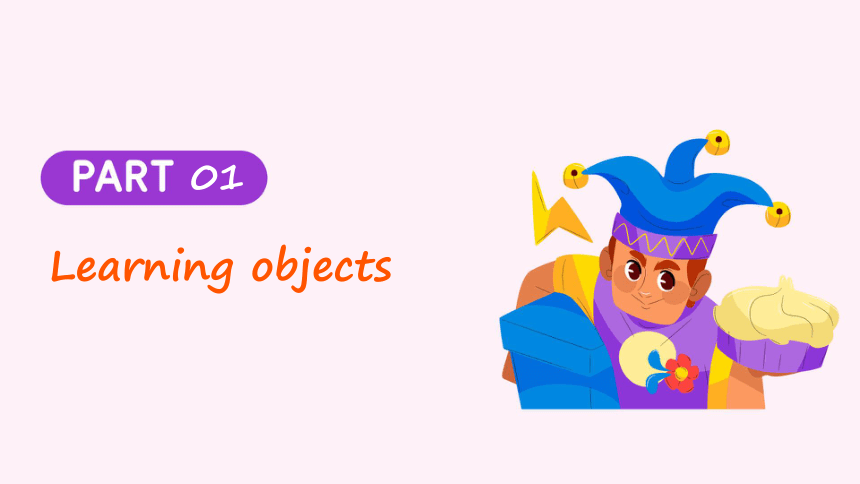

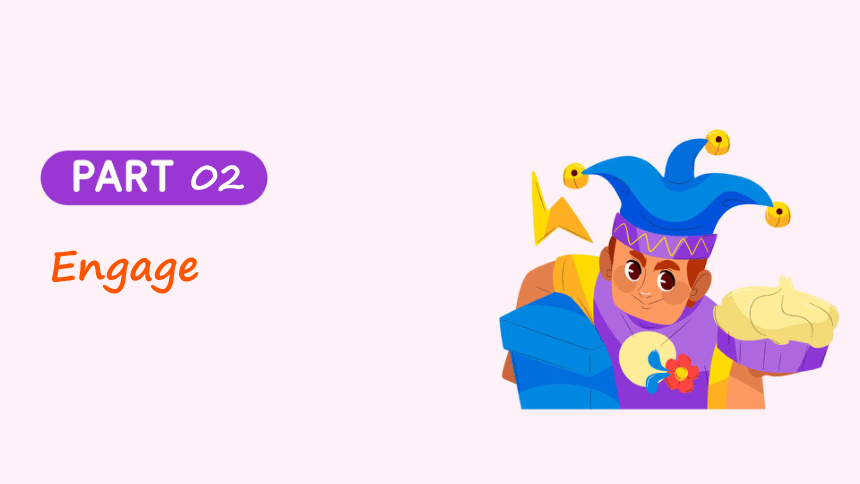
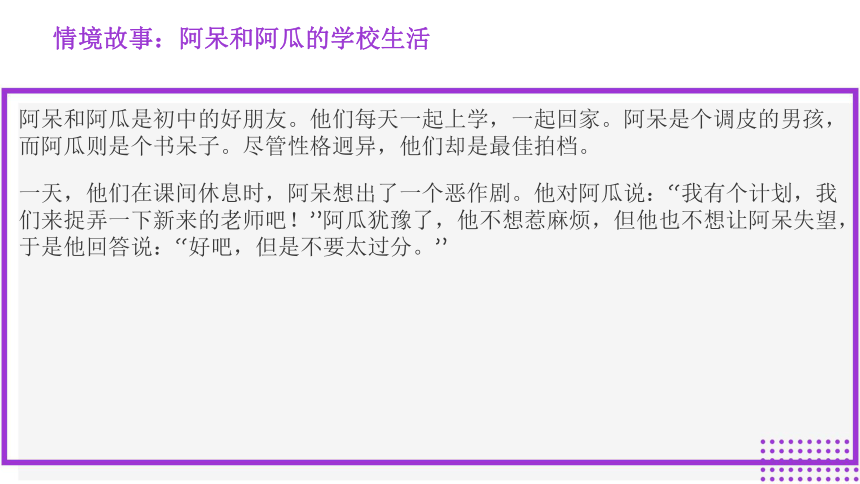
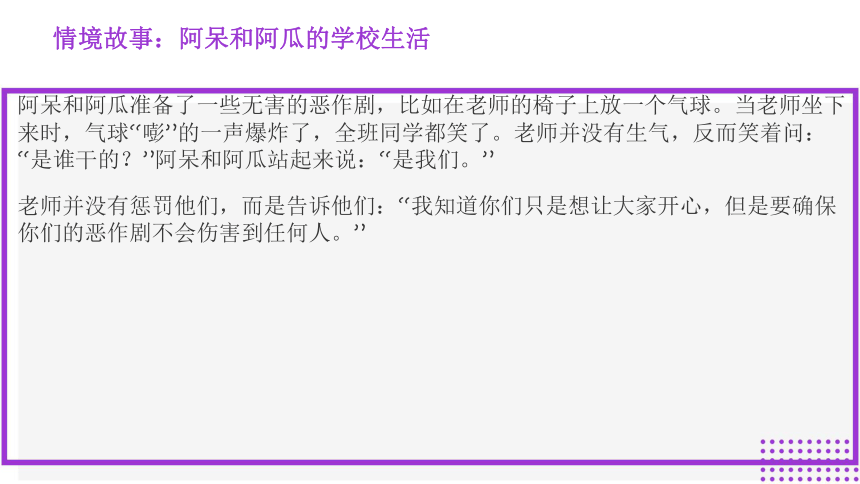
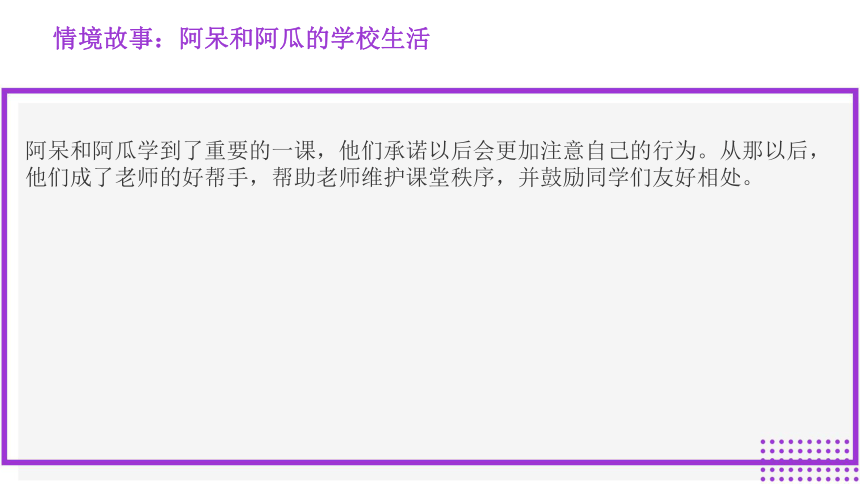

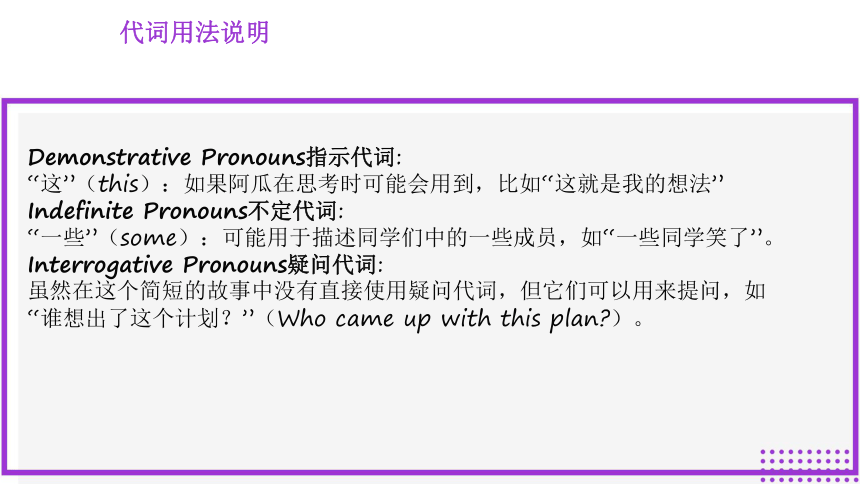

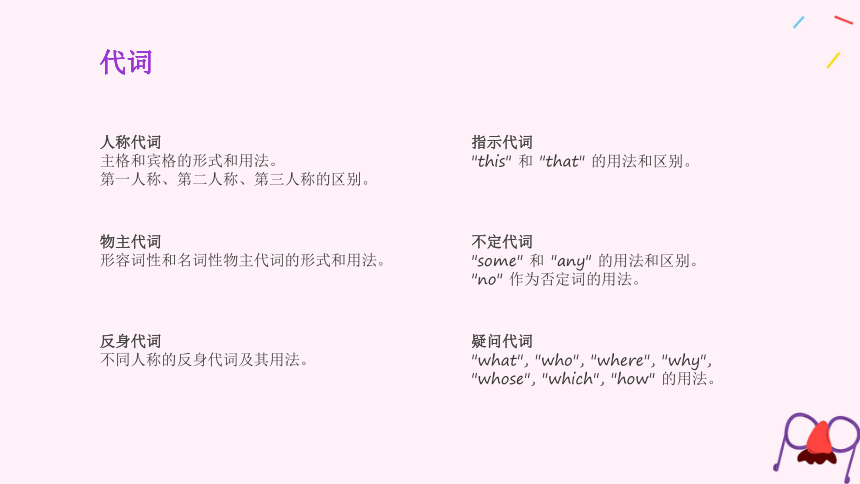
文档简介
(共33张PPT)
初中语法复习系列课:代词
CONTENTS
Part 1 Learning objects
Part 2:Engage
Part 3:Study
Part 4:Activate
Part 5:Summary
01
Learning objects
Learning objects
理解代词的分类。
掌握不同种类代词的用法及解题技巧。
巩固代词各考点及易错点。
02
Engage
阿呆和阿瓜是初中的好朋友。他们每天一起上学,一起回家。阿呆是个调皮的男孩,而阿瓜则是个书呆子。尽管性格迥异,他们却是最佳拍档。
一天,他们在课间休息时,阿呆想出了一个恶作剧。他对阿瓜说:“我有个计划,我们来捉弄一下新来的老师吧!”阿瓜犹豫了,他不想惹麻烦,但他也不想让阿呆失望,于是他回答说:“好吧,但是不要太过分。”
情境故事:阿呆和阿瓜的学校生活
阿呆和阿瓜准备了一些无害的恶作剧,比如在老师的椅子上放一个气球。当老师坐下来时,气球“嘭”的一声爆炸了,全班同学都笑了。老师并没有生气,反而笑着问:“是谁干的?”阿呆和阿瓜站起来说:“是我们。”
老师并没有惩罚他们,而是告诉他们:“我知道你们只是想让大家开心,但是要确保你们的恶作剧不会伤害到任何人。”
情境故事:阿呆和阿瓜的学校生活
阿呆和阿瓜学到了重要的一课,他们承诺以后会更加注意自己的行为。从那以后,他们成了老师的好帮手,帮助老师维护课堂秩序,并鼓励同学们友好相处。
情境故事:阿呆和阿瓜的学校生活
代词用法说明
Personal Pronouns人称代词::
“他们”(they):在故事中指代阿呆和阿瓜。
“他”(he):有时指代阿呆,有时指代老师。
“我”(I):在故事中指代阿瓜的内心想法。
Possessive Pronouns物主代词:
“他们的”(their):用来指代阿呆和阿瓜共同拥有的东西,如计划。
“我的”(my):阿呆提到自己的计划时使用。
Reflexive Pronouns反身代词:
“自己”(themselves):在故事中指代阿呆和阿瓜,强调他们自己站起来承认恶作剧
代词用法说明
Demonstrative Pronouns指示代词:
“这”(this):如果阿瓜在思考时可能会用到,比如“这就是我的想法”
Indefinite Pronouns不定代词:
“一些”(some):可能用于描述同学们中的一些成员,如“一些同学笑了”。
Interrogative Pronouns疑问代词:
虽然在这个简短的故事中没有直接使用疑问代词,但它们可以用来提问,如“谁想出了这个计划?”(Who came up with this plan )。
03
Study
代词
代词
人称代词
主格和宾格的形式和用法。
第一人称、第二人称、第三人称的区别。
物主代词
形容词性和名词性物主代词的形式和用法。
反身代词
不同人称的反身代词及其用法。
指示代词
"this" 和 "that" 的用法和区别。
不定代词
"some" 和 "any" 的用法和区别。
"no" 作为否定词的用法。
疑问代词
"what", "who", "where", "why", "whose", "which", "how" 的用法。
人称代词
人称代词用于代替人或事物,有主格和宾格之分,以及第一、第二、第三人称的差别。
主格:用作句子的主语,如 "I", "you", "he", "she", "it", "we", "they"。
宾格:用作动词或介词的宾语,如 "me", "you", "him", "her", "it", "us", "them"。
使用示例:
主格:I (我) am going to the store. -> We (我们) are going to the store.
宾格:She saw me (我) at the store. -> They saw us (我们) at the store.
物主代词
物主代词用于表示所有格,有形容词性和名词性之分。
形容词性物主代词:必须后面跟名词,如 "my", "your", "his", "her", "its", "our", "their"。
名词性物主代词:独立使用,不需要后面跟名词,如 "mine", "yours", "his", "hers", "ours", "theirs"。
使用示例:
形容词性:This is my book (这是我的书). -> These are their books (这些是他们的书籍)。
名词性:The book is mine (这本书是我的). -> The books are theirs (这些书是他们的)。
反身代词
反身代词用于强调执行动作的人,与主语的人称和数一致。
第一人称:myself (我), ourselves (我们)。
第二人称:yourself (你), yourselves (你们)。
第三人称:himself (他), herself (她), itself (它), themselves (他们)。
使用示例:
She made herself (她自己) a sandwich. -> They enjoyed themselves (他们自己) at the party
指示代词
指示代词用于指明特定的人或事物。
this:指较近的人或事物,如 "this book" (这本书)。
that:指较远的人或事物,如 "that house" (那所房子)。
使用示例:
This is the book you wanted (这是你想要的书). -> That is the house where he lives (那是他住的房子).
不定代词
不定代词用于指代不确定的人或事物,常见的有 "some", "any", "no", "none", "both", "either", "neither" 等。
some:用于肯定句,表示一些,如 "some water" (一些水)。
any:用于疑问句或否定句,表示任何,如 "Do you have any questions " (你有任何问题吗?).
no和none:表示否定,none 可以回答数量,如 "I have no idea" (我没有任何头绪), "None of them are correct" (他们中没有一个是正确的).
使用示例:
I would like some more tea (我想再要一些茶). -> Would you like any more bread (你还要面包吗?).
疑问代词
疑问代词用于引导特殊疑问句,询问特定的信息。
what:询问是什么,如 "What is this " (这是什么?).
who:询问是谁,如 "Who is there " (谁在那里?).
where:询问在哪里,如 "Where are you going " (你要去哪里?).
why:询问为什么,如 "Why did you do that " (你为什么要那样做?).
whose:询问属于谁,如 "Whose book is this " (这是谁的书?).
which:询问哪一个,如 "Which one do you prefer " (你更喜欢哪一个?).
how:询问如何,如 "How do you feel " (你感觉如何?).
使用示例:
What are you doing tonight (你今晚打算做什么?) -> Whose bicycle is this (这是谁的自行车?)
04
Activate
Activate
单项选择题
练习代词在句子中的正确使用。
语法填空
练习在空白处填入正确的代词形式。
微完形填空
练习在短文中填入合适的代词。
微阅读
通过阅读短文理解代词的上下文用法。
1.All of us enjoyed the party, and ______ had a great time.
A. everyone B. every one C. nobody D. somebody
2.I have two pencils, but I need to buy ______.
A. another B. other C. others D. the other
3.The teacher said that ______ in our class passed the test.
A. all B. none C. some D. any
4.There are many books on the shelf, but ______ are interesting to me.
A. all B. none C. few D. both
单项选择题
5.I don't like these apples; please give me ______.
A. other B. others C. another D. the other
6.This is not my book; it must be ______.
A. yours B. yours' C. you D. yourself
7.The boys were playing in the garden, and ______ were happy.
A. they B. them C. their D. theirs
8.Can ______ help me with my homework
A. you B. yours C. yourself D. yourselves
1.After the game, the team celebrated their victory and each player praised ____________.(they)
2.This is not my book, ______ (I)must be yours.
3.Between you and me, _______ (I)think we can win the competition.
4.Can you pass the ball to _______(I) I'm open.
themselves
mine
I
me
语法填空
微完形填空
1.Every morning, I see a cat sitting on the fence. I think it's the neighbor's cat. I often give ______ some milk.
A. it B. them C. he
2.Ashuai and Adai were talking about their favorite fruits. Ashuai said, "I like apples, but Adai prefers oranges." Adai agreed and said, "Yes, _______ are my favorite."
A. I B. me C. they
微完形填空
3.Mr. Jin asked the students to clean the classroom. He said, "I want everyone to take part in the cleaning. Remember, _______ should do their part."
A. us B. we C. you all
4.Adai was feeling sick, so Ashuai decided to help her. He said, "Don't worry, _______ will take care of everything."
A. I B. me C. myself
微完形填空
5.The teacher told the class, "Please turn to page 10." All the students opened their books and found _______.
A. it B. they C. them
6.Ashuai and Apang were discussing their weekend plans. Ashuai said, "I'm going to the library, and _______ is going to the museum."
A. he B. him C. his
微阅读
1.Tom and Jerry are playing in the park. Tom is chasing Jerry around the trees. Suddenly, Jerry climbs a tree and Tom can't find him. Tom thinks, "Where did Jerry go "
问题:Who is Tom trying to find
A. Jerry B. Tom C. A tree
2. Ashuai went to the bookstore with Adai. Ashuai wanted to buy a novel, but Adai was looking for a dictionary. In the end, Ashuai found a novel that he liked, and Adai found a dictionary that she needed.
问题:What did Ashuai want to buy
A. A dictionary B. A novel C. A magazine
微阅读
3.Mr. Jin is a teacher who always encourages his students to ask questions. He says, "If you have any questions, don't hesitate to ask."
问题:What is Mr. Jin's profession
A. A doctor B. A teacher C. A student
4.Adai and Apang are brothers. They both like to play soccer. Today, they played soccer in the park and had a great time.
问题:What activity did Adai and Apang enjoy
A. Reading B. Playing soccer C. Cooking
微阅读
5.The students in the classroom were discussing their weekend plans. Some wanted to go to the movies, others planned to visit the museum, and a few were going to have a picnic.
问题:What were the students discussing
A. Their school projects
B. Their weekend plans
C. Their favorite subjects
6.Ashuai found a lost wallet on the street. He decided to take it to the police station. The police officer said, "Thank you for bringing this wallet. We will try to find the owner."
问题:What did Ashuai find
A. A book B. A wallet C. A phone
05
Summary
1. **人称代词**:用来指代人或事物,分为主格和宾格。
- 主格(I, you, he, she, it, we, they)用作句子的主语。
- 宾格(me, you, him, her, it, us, them)用作动词或介词的宾语。
2. **物主代词**:用来表示所有格,分为形容词性和名词性。
- 形容词性物主代词(my, your, his, her, its, our, their)后面必须跟名词。
- 名词性物主代词(mine, yours, his, hers, its, ours, theirs)独立使用,前面没有名词。
3. **反身代词**:用来指代动作的执行者和承受者是同一个人。
- 如:I (myself), you (yourself), he (himself), she (herself), it (itself), we (ourselves), they (themselves)。
代词的用法
4. **指示代词**:用来指明特定的人或事物。
- this 和 these 用于指近处的人或事物。
- that 和 those 用于指远处的人或事物。
5. **不定代词**:用来指代不确定的人或事物。
- some 用于肯定句,表示“一些”。
- any 用于疑问句或否定句,表示“任何”。
- no 和 none 表示否定。
6. **疑问代词**:用来引导特殊疑问句,询问特定的信息。
- what, who, where, when, why, how 等。
THE END
THANKS
初中语法复习系列课:代词
CONTENTS
Part 1 Learning objects
Part 2:Engage
Part 3:Study
Part 4:Activate
Part 5:Summary
01
Learning objects
Learning objects
理解代词的分类。
掌握不同种类代词的用法及解题技巧。
巩固代词各考点及易错点。
02
Engage
阿呆和阿瓜是初中的好朋友。他们每天一起上学,一起回家。阿呆是个调皮的男孩,而阿瓜则是个书呆子。尽管性格迥异,他们却是最佳拍档。
一天,他们在课间休息时,阿呆想出了一个恶作剧。他对阿瓜说:“我有个计划,我们来捉弄一下新来的老师吧!”阿瓜犹豫了,他不想惹麻烦,但他也不想让阿呆失望,于是他回答说:“好吧,但是不要太过分。”
情境故事:阿呆和阿瓜的学校生活
阿呆和阿瓜准备了一些无害的恶作剧,比如在老师的椅子上放一个气球。当老师坐下来时,气球“嘭”的一声爆炸了,全班同学都笑了。老师并没有生气,反而笑着问:“是谁干的?”阿呆和阿瓜站起来说:“是我们。”
老师并没有惩罚他们,而是告诉他们:“我知道你们只是想让大家开心,但是要确保你们的恶作剧不会伤害到任何人。”
情境故事:阿呆和阿瓜的学校生活
阿呆和阿瓜学到了重要的一课,他们承诺以后会更加注意自己的行为。从那以后,他们成了老师的好帮手,帮助老师维护课堂秩序,并鼓励同学们友好相处。
情境故事:阿呆和阿瓜的学校生活
代词用法说明
Personal Pronouns人称代词::
“他们”(they):在故事中指代阿呆和阿瓜。
“他”(he):有时指代阿呆,有时指代老师。
“我”(I):在故事中指代阿瓜的内心想法。
Possessive Pronouns物主代词:
“他们的”(their):用来指代阿呆和阿瓜共同拥有的东西,如计划。
“我的”(my):阿呆提到自己的计划时使用。
Reflexive Pronouns反身代词:
“自己”(themselves):在故事中指代阿呆和阿瓜,强调他们自己站起来承认恶作剧
代词用法说明
Demonstrative Pronouns指示代词:
“这”(this):如果阿瓜在思考时可能会用到,比如“这就是我的想法”
Indefinite Pronouns不定代词:
“一些”(some):可能用于描述同学们中的一些成员,如“一些同学笑了”。
Interrogative Pronouns疑问代词:
虽然在这个简短的故事中没有直接使用疑问代词,但它们可以用来提问,如“谁想出了这个计划?”(Who came up with this plan )。
03
Study
代词
代词
人称代词
主格和宾格的形式和用法。
第一人称、第二人称、第三人称的区别。
物主代词
形容词性和名词性物主代词的形式和用法。
反身代词
不同人称的反身代词及其用法。
指示代词
"this" 和 "that" 的用法和区别。
不定代词
"some" 和 "any" 的用法和区别。
"no" 作为否定词的用法。
疑问代词
"what", "who", "where", "why", "whose", "which", "how" 的用法。
人称代词
人称代词用于代替人或事物,有主格和宾格之分,以及第一、第二、第三人称的差别。
主格:用作句子的主语,如 "I", "you", "he", "she", "it", "we", "they"。
宾格:用作动词或介词的宾语,如 "me", "you", "him", "her", "it", "us", "them"。
使用示例:
主格:I (我) am going to the store. -> We (我们) are going to the store.
宾格:She saw me (我) at the store. -> They saw us (我们) at the store.
物主代词
物主代词用于表示所有格,有形容词性和名词性之分。
形容词性物主代词:必须后面跟名词,如 "my", "your", "his", "her", "its", "our", "their"。
名词性物主代词:独立使用,不需要后面跟名词,如 "mine", "yours", "his", "hers", "ours", "theirs"。
使用示例:
形容词性:This is my book (这是我的书). -> These are their books (这些是他们的书籍)。
名词性:The book is mine (这本书是我的). -> The books are theirs (这些书是他们的)。
反身代词
反身代词用于强调执行动作的人,与主语的人称和数一致。
第一人称:myself (我), ourselves (我们)。
第二人称:yourself (你), yourselves (你们)。
第三人称:himself (他), herself (她), itself (它), themselves (他们)。
使用示例:
She made herself (她自己) a sandwich. -> They enjoyed themselves (他们自己) at the party
指示代词
指示代词用于指明特定的人或事物。
this:指较近的人或事物,如 "this book" (这本书)。
that:指较远的人或事物,如 "that house" (那所房子)。
使用示例:
This is the book you wanted (这是你想要的书). -> That is the house where he lives (那是他住的房子).
不定代词
不定代词用于指代不确定的人或事物,常见的有 "some", "any", "no", "none", "both", "either", "neither" 等。
some:用于肯定句,表示一些,如 "some water" (一些水)。
any:用于疑问句或否定句,表示任何,如 "Do you have any questions " (你有任何问题吗?).
no和none:表示否定,none 可以回答数量,如 "I have no idea" (我没有任何头绪), "None of them are correct" (他们中没有一个是正确的).
使用示例:
I would like some more tea (我想再要一些茶). -> Would you like any more bread (你还要面包吗?).
疑问代词
疑问代词用于引导特殊疑问句,询问特定的信息。
what:询问是什么,如 "What is this " (这是什么?).
who:询问是谁,如 "Who is there " (谁在那里?).
where:询问在哪里,如 "Where are you going " (你要去哪里?).
why:询问为什么,如 "Why did you do that " (你为什么要那样做?).
whose:询问属于谁,如 "Whose book is this " (这是谁的书?).
which:询问哪一个,如 "Which one do you prefer " (你更喜欢哪一个?).
how:询问如何,如 "How do you feel " (你感觉如何?).
使用示例:
What are you doing tonight (你今晚打算做什么?) -> Whose bicycle is this (这是谁的自行车?)
04
Activate
Activate
单项选择题
练习代词在句子中的正确使用。
语法填空
练习在空白处填入正确的代词形式。
微完形填空
练习在短文中填入合适的代词。
微阅读
通过阅读短文理解代词的上下文用法。
1.All of us enjoyed the party, and ______ had a great time.
A. everyone B. every one C. nobody D. somebody
2.I have two pencils, but I need to buy ______.
A. another B. other C. others D. the other
3.The teacher said that ______ in our class passed the test.
A. all B. none C. some D. any
4.There are many books on the shelf, but ______ are interesting to me.
A. all B. none C. few D. both
单项选择题
5.I don't like these apples; please give me ______.
A. other B. others C. another D. the other
6.This is not my book; it must be ______.
A. yours B. yours' C. you D. yourself
7.The boys were playing in the garden, and ______ were happy.
A. they B. them C. their D. theirs
8.Can ______ help me with my homework
A. you B. yours C. yourself D. yourselves
1.After the game, the team celebrated their victory and each player praised ____________.(they)
2.This is not my book, ______ (I)must be yours.
3.Between you and me, _______ (I)think we can win the competition.
4.Can you pass the ball to _______(I) I'm open.
themselves
mine
I
me
语法填空
微完形填空
1.Every morning, I see a cat sitting on the fence. I think it's the neighbor's cat. I often give ______ some milk.
A. it B. them C. he
2.Ashuai and Adai were talking about their favorite fruits. Ashuai said, "I like apples, but Adai prefers oranges." Adai agreed and said, "Yes, _______ are my favorite."
A. I B. me C. they
微完形填空
3.Mr. Jin asked the students to clean the classroom. He said, "I want everyone to take part in the cleaning. Remember, _______ should do their part."
A. us B. we C. you all
4.Adai was feeling sick, so Ashuai decided to help her. He said, "Don't worry, _______ will take care of everything."
A. I B. me C. myself
微完形填空
5.The teacher told the class, "Please turn to page 10." All the students opened their books and found _______.
A. it B. they C. them
6.Ashuai and Apang were discussing their weekend plans. Ashuai said, "I'm going to the library, and _______ is going to the museum."
A. he B. him C. his
微阅读
1.Tom and Jerry are playing in the park. Tom is chasing Jerry around the trees. Suddenly, Jerry climbs a tree and Tom can't find him. Tom thinks, "Where did Jerry go "
问题:Who is Tom trying to find
A. Jerry B. Tom C. A tree
2. Ashuai went to the bookstore with Adai. Ashuai wanted to buy a novel, but Adai was looking for a dictionary. In the end, Ashuai found a novel that he liked, and Adai found a dictionary that she needed.
问题:What did Ashuai want to buy
A. A dictionary B. A novel C. A magazine
微阅读
3.Mr. Jin is a teacher who always encourages his students to ask questions. He says, "If you have any questions, don't hesitate to ask."
问题:What is Mr. Jin's profession
A. A doctor B. A teacher C. A student
4.Adai and Apang are brothers. They both like to play soccer. Today, they played soccer in the park and had a great time.
问题:What activity did Adai and Apang enjoy
A. Reading B. Playing soccer C. Cooking
微阅读
5.The students in the classroom were discussing their weekend plans. Some wanted to go to the movies, others planned to visit the museum, and a few were going to have a picnic.
问题:What were the students discussing
A. Their school projects
B. Their weekend plans
C. Their favorite subjects
6.Ashuai found a lost wallet on the street. He decided to take it to the police station. The police officer said, "Thank you for bringing this wallet. We will try to find the owner."
问题:What did Ashuai find
A. A book B. A wallet C. A phone
05
Summary
1. **人称代词**:用来指代人或事物,分为主格和宾格。
- 主格(I, you, he, she, it, we, they)用作句子的主语。
- 宾格(me, you, him, her, it, us, them)用作动词或介词的宾语。
2. **物主代词**:用来表示所有格,分为形容词性和名词性。
- 形容词性物主代词(my, your, his, her, its, our, their)后面必须跟名词。
- 名词性物主代词(mine, yours, his, hers, its, ours, theirs)独立使用,前面没有名词。
3. **反身代词**:用来指代动作的执行者和承受者是同一个人。
- 如:I (myself), you (yourself), he (himself), she (herself), it (itself), we (ourselves), they (themselves)。
代词的用法
4. **指示代词**:用来指明特定的人或事物。
- this 和 these 用于指近处的人或事物。
- that 和 those 用于指远处的人或事物。
5. **不定代词**:用来指代不确定的人或事物。
- some 用于肯定句,表示“一些”。
- any 用于疑问句或否定句,表示“任何”。
- no 和 none 表示否定。
6. **疑问代词**:用来引导特殊疑问句,询问特定的信息。
- what, who, where, when, why, how 等。
THE END
THANKS
同课章节目录
- 词法
- 名词
- 动词和动词短语
- 动词语态
- 动词时态
- 助动词和情态动词
- 非谓语动词
- 冠词
- 代词
- 数词和量词
- 形容词副词及其比较等级
- 介词和介词短语
- 连词和感叹词
- 构词法
- 相似、相近词比较
- 句法
- 陈述句
- 一般疑问句和否定疑问句
- 特殊疑问句及选择疑问句
- 反意疑问句
- 存在句(There be句型)
- 宾语从句
- 定语从句
- 状语从句
- 主谓一致问题
- 简单句
- 并列句
- 复合句
- 主谓一致
- 主、表语从句
- 名词性从句
- 直接引语和间接引语
- 虚拟语气
- 感叹句
- 强调句
- 倒装句
- 祈使句
- 句子的成分
- 句子的分类
- 题型专区
- 单项选择部分
- 易错题
- 完形填空
- 阅读理解
- 词汇练习
- 听说训练
- 句型转换
- 补全对话
- 短文改错
- 翻译
- 书面表达
- 任务型阅读
- 语法填空
- 其他资料
